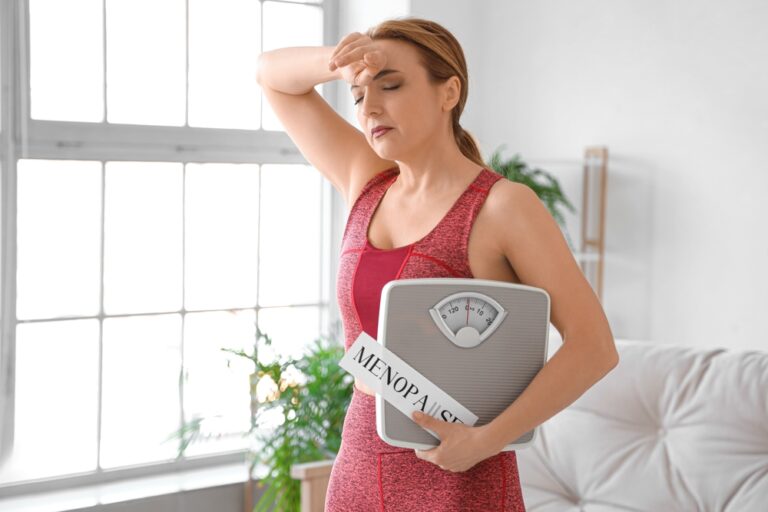
Depression is a mental health status that reveals itself through persistent and elongated feelings of sadness, worthlessness and hopelessness. Depression can come in many different forms and can be a debilitating, deadly mental disorders if they are not treated properly. Although depression can influence everyone, regardless of age and gender, women have twice as much chance as men to experience depression, especially when they go through the menopause.
Menopausal depression
Menopausal depression is the increase in the severity or development of depression in women who start to go through menopause. The relationship between depression and the menopause is quite complex and extensive. Perimenopause, menopause and the menstrual cycle are all associated with important hormonal changes and estrogen balances in the body of a woman. This imbalance can lead to psychological problems, mood disorders and painful physical symptoms. Most of these symptoms develop during the first phase of menopause, called perimenopause.
Perimenopause symptoms
This is usually the phase that women most talk about when discussing the menopause, because it is the phase related to most changes and symptoms. Perimenopause is the transition period for menopause when the body of a woman starts to experience hormonal changes that cause different physical and emotional irregularities. During this period, women can experience fluctuations in hormone levels, causing mood swings, irritability and depression. They can also undergo hot flashes, night sweat, chills and many other symptoms.
Hot flashes are one of the most important physical problems of perimenopause and this probably happens when women sleep. Hot flashes will periodically wake someone up and this constant sleep intake can manifest itself in insomnia. Lack of sleep can increase the chance of developing depression by 10 times.
Why does it happen?
Researchers believe that hormonal changes during menopause stages in some women can contribute to the development of depression. As women start working, their menstrual cycles become extremely irregular, ie shorter, longer, heavier or lighter. These changes in the menstrual cycle are caused by fluctuating levels of estrogen. These levels of estrogen also influence the serotonin levels in the brain. Estrogen plays a crucial role in regulating the mood, and falling levels of this hormone can affect brain chemistry and cause mood disorders. When the serotonin levels fall, this causes an increase in sadness, fear and fatigue. These are all important symptoms of depression.
External factors
In addition to hormonal and physical changes, significant changes in life can worsen the effects of the menopause. Some women experience clear changes to their family dynamics, such as marital problems, taking care of aging parents or children who leave the house. Such changes can be overwhelming and stressful, causing depression or increased fear. This makes it even more difficult to deal with normal life stressors when you are also dealing with psychological problems. It is therefore logical that depression is not an unusual development when women go through the menopause. Also keep in mind that women with a history of depression or other mental disorders also run a higher risk of developing depression of menopause.
Menopause and fear
Lifestyle changes
Embracing regular exercise, eating healthy and getting enough sleep can help manage the depression of the menopause. Regular exercise increases the production of endorphins, which are natural mood boosters. By doing moderately intensive exercises daily for at least 30 minutes, the desirable results can produce in both your physical and mental health. It is also useful to opt for techniques for stress reduction such as yoga or meditation.
Counseling of therapy
Therapy offers an open and supporting environment to explore different emotions and to develop coping mechanisms to manage psychological problems. This could look like a member of a support group for people with depression or attending individual therapy. View some free therapy options or contact your insurance provider to see about financial help if that is a care at the start of your therapy trip.
Alternative therapies
Natural remedies such as acupuncture or herb supplements can also offer lighting. Acupuncture uses small needles to activate the natural healing process of the body. Individuals can also use herbal supplements to reduce depressive or anxious symptoms. However, consult your doctor before taking supplements, especially if you are already using antidepressants.
Hormone therapy
This treatment usually includes taking estrogen or progesterone to relieve menopausal symptoms, such as hot flashes and vaginal dryness. Hormone therapy is also ideal for improving the mood or reducing a depression risk in some women. However, the treatment can be unsuitable for some because of the possible increased risk of breast cancer, stroke and blood clots. If you experience some of these symptoms, contact your doctor about the possibility of hormone replacements.
Antidepressants
Antidepressants are often used to treat depression because they help to regulate brain chemistry and improve your mood. Since estrogen and consequently serotonin levels fluctuate during the menopause, antidepressants such as selective serotonin re -admission inhibitors (SSRIs) are an excellent option. SSRIs can minimize depressive symptoms by stabilizing serotonin levels in the brain.
Know when to seek help
If you experience depression symptoms during the perimenopause and significantly influence your well -being, consider seeking help from a health care professional. With the right treatment and support you can manage depression during menopause and better your overall quality of life. A psychiatrist or a therapist will be essential and can help minimize side effects and help them maintain a healthy lifestyle routine.
References:
Medvidi
Can the menopause cause depression? | Johns Hopkins Medicine


